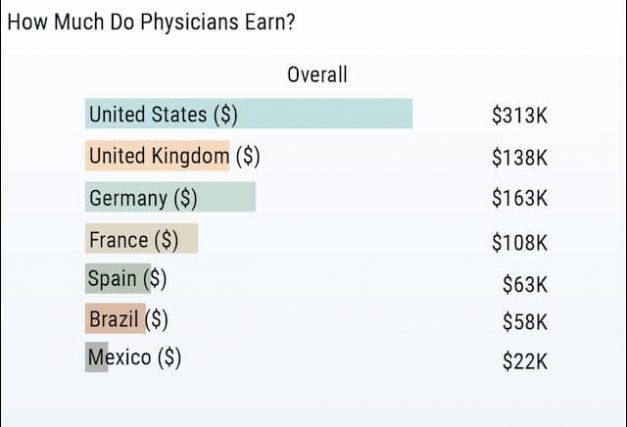The Patients of Medical Tourism in France

The medical tourism industry is growing. And France is a popular destination for medical tourists
Healthcare spending in the U.S. is higher than all other developed countries — and it’s primarily due to prices. The New York Times recently reported that an angioplasty costs an average of $32,000 in America, compared to $6,400 in the Netherlands.
With such a large gap in medical care costs, financially-savvy patients are looking to travel abroad to take advantage of affordable alternatives. The medical tourism industry is growing. And France is a popular destination for medical tourists.
The Growth of Medical Tourism
Although medical tourism is not a new concept, it seems that more individuals are sharing their experiences about their medical vacations. But what is fueling the increasing popularity? Cost and ease of travel may be the most significant reasons.
There are many factors behind why medical procedures are more expensive in the U.S. The cost of malpractice insurance could be one of the top reasons. The American Medical Association (AMA) reports that obstetricians can pay as much as $214,999 per year in malpractice insurance. That’s almost $18,000 per month just for one type of insurance. Doctors in other countries don’t have to pay for malpractice coverage because lawsuits aren’t a common practice.

Source: Medscape
Another factor behind the high cost of American healthcare is doctor salary. Doctors in France are public health servants and earn less than their American counterparts. French physicians earn an average of $108,000 annually, compared to $313,000 in the United States. Salaries, medical malpractice fees, and the cost of pharmaceuticals and equipment are all passed on to the patient.
Considering that travelling abroad for heart surgery can save you tens of thousands of dollars, the growth in medical tourism isn’t a surprise. The American Journal of Medicine lists the top 10 procedures medical tourists are travelling overseas to receive:
- Dentistry
- Cosmetic surgery
- Cardiac conditions
- In vitro fertility
- Weight loss
- Dermatology
- Liver and kidney transplants
- Spinal surgery
Medical Tourism in France
Although cost is an important reason for medical tourism, some patients travel overseas for services they don’t have access to in their own country. Countries like Thailand, Mexico, and Taiwan are popular destinations for treatment. But for many patients, France’s high medical standards are a major selling factor. France ranks third in Europe on treatable causes of mortality, based on its successes against curable cancers (including colon and breast cancer), heart disease, and stroke.
Getting medical treatment in France is fairly straightforward. Procedures are affordable and wait times for care are often reasonable. No visa is required as long as you have a valid passport and stay for a maximum of three months. Private hospitals are staffed with medical professionals who can speak English. Translators are also available. And recovering in France gives you a great opportunity to relax, enjoy the country’s cuisine, and take in the rich culture.
France’s currency is the Euro (€), which currently exchanges for roughly $1.10. Compare the average costs of medical treatments for foreign patients in France with what your local doctor quoted you:
- Knee Arthroscopy: €3,600 – €4,000
- Hip Replacement (With Implant and Rehabilitation): €11,000 – €11,500
- Breast Augmentation: €3,300 – €3,800
- Gastric Banding: €5,200 – €6,400
- Dental Implants: €2,000 – €2,100
To get started on your search to receive medical treatment in France, look for French healthcare assistance companies. They simplify the process by serving as your medical concierge to quote prices and arrange your treatment, recovery, lodging, and other logistics, basically a medical tourism travel agent. As with all important decisions, compare several companies and check references.
Medical Tourism Risks
There are many benefits to travelling overseas for treatments. Less expensive interventions and the chance to visit a new and exotic location are among the top reasons. But the Center for Disease Control (CDC) warns that medical tourism can be risky. General issues that pose a risk include:
Language Barrier
Communication is critical during medical treatment, so both the patient and the doctor have a clear understanding of what is going on. If you’re travelling overseas, make sure you choose a facility with staff fluent in English to avoid any misunderstandings. Luckily, most French healthcare professionals speak English. And if you’ve booked your treatment through a healthcare assistance company, you’ll probably be receiving care in a private hospital accustomed to medical tourists from around the world, with translators on standby to assist.
Differing Medical Standards
Foreign health care providers and medical facilities may have different standards compared to the United States. It’s vital you do your due diligence and carefully check the qualifications of the medical facility and doctor(s) who will be doing the procedure. Ask for a doctor or medical facility’s credentials and check them with the accrediting body. Some recognizable international accrediting groups include:
- DNV International Accreditation for Hospitals
- Global Healthcare Accreditation (for medical travel)
- Joint Commission International
Quality of Medication
The CDC warns that medication may be of poor quality or even counterfeit in certain countries. It’s unlikely an issue in France, where pharmaceuticals are highly regulated.
Flying After Surgery
It’s essential to allow yourself enough time to recover before you fly to minimize the risk of blood clots or complications. If, for example, you travel to France for the lower cost of giving birth, be sure to plan for longer recovery time. The postpartum period’s subacute phase, which is the primary post-birth recovery period, can last two to six weeks. That can eat into your budget as well as many other considerations. No matter the procedure, it’s best to defer to a doctor’s recommendation since a doctor’s release is needed before you can get on a plane at either end of your journey.
Is Traveling to France for Medical Procedures Worth It?
Receiving treatment in France can save you thousands of dollars. The French healthcare system is comparable in quality to the American system as far as technology and advancements go. With a little bit of research and advance preparation, your medical procedure should go smoothly. Plus, you’ll have the opportunity to immerse yourself in French culture for a memorable experience.
